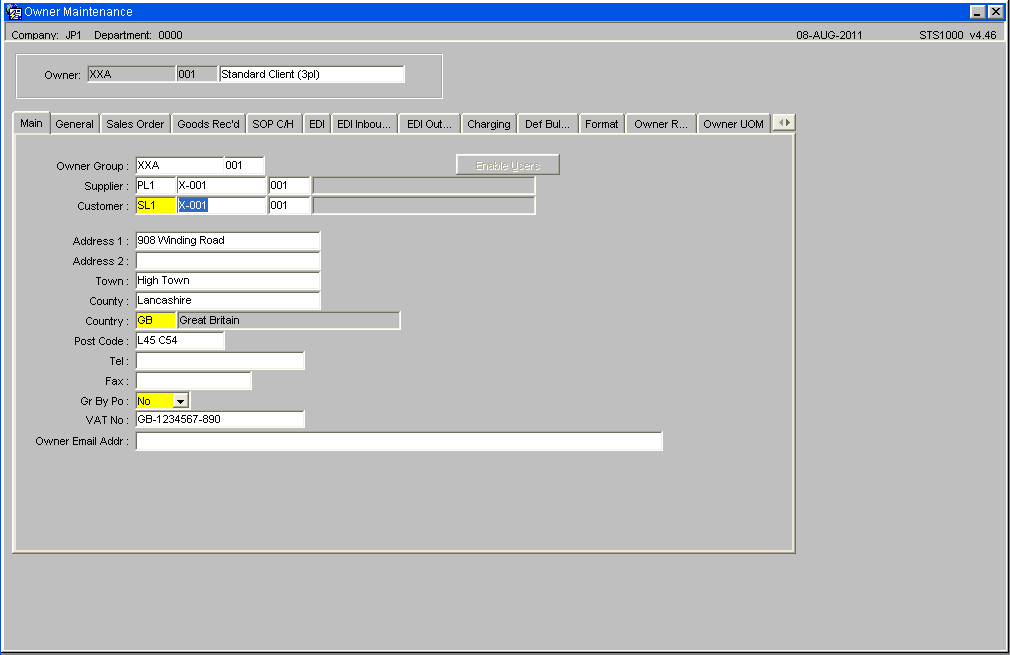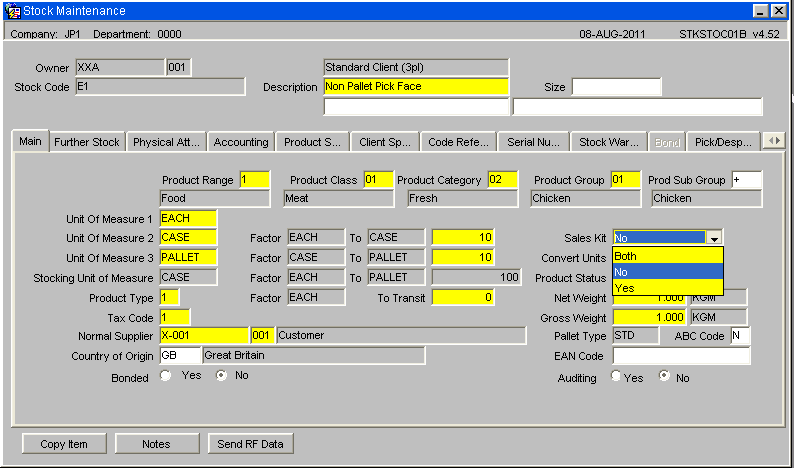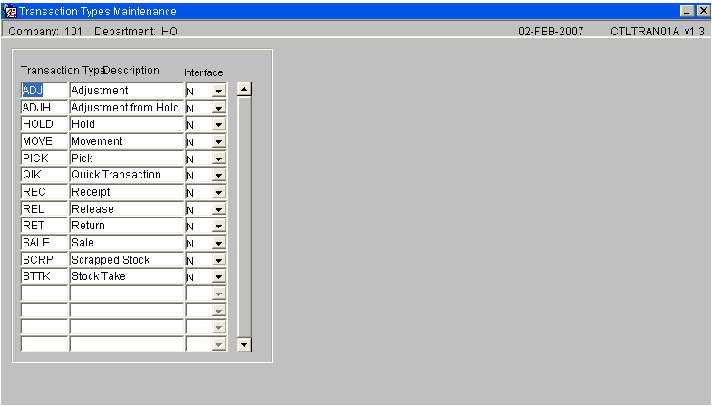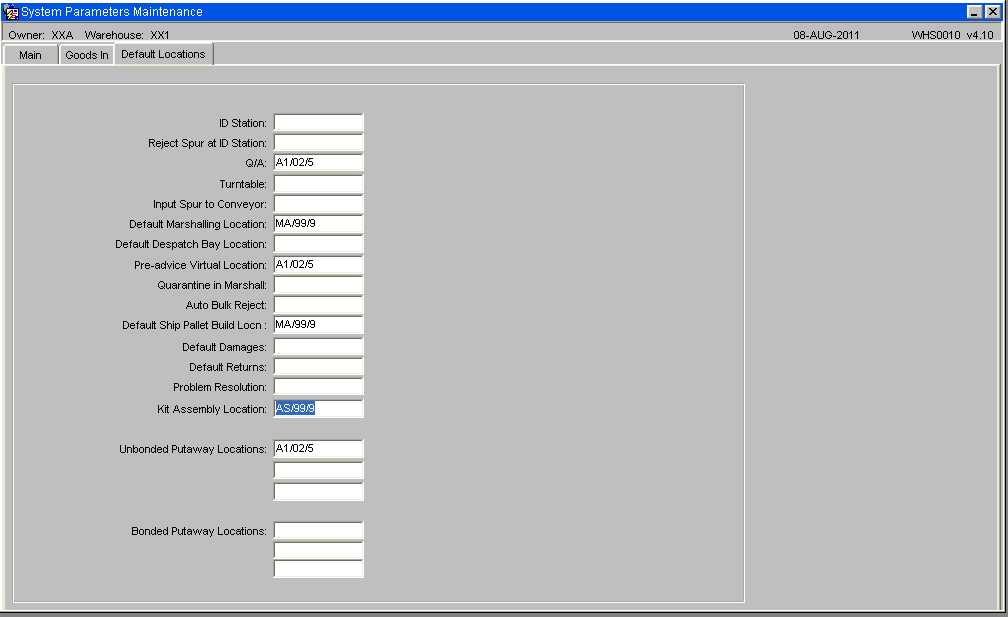Kitting Setup and Process
System Set Up
Transaction Types Maintenance (CTLTRAN01A)
Ensure that there is a 'ADJK' (Adjustment Kitting) record in the Transaction Types Maintenance screen
This screen only has to be amended/created if wanting to use the Transactions Report. The system will automatically generate the Transaction Types when processing. Note, some of the Transaction Types are already created when opening this screen. The values below are the default types.
![]() Note:
Note:
- The Transaction denotes each system or user generated transaction type during all processes
- The Interface flag is used is client specific EDI Processing
System Parameters (WHS0010)
To raise an assembly order request, an assembly location must be set against the warehouse in the System Parameters – Default Locations tab. The field will be labelled, ‘Assembly Location’. Kits will be assembled and stored in this location.
The other fields in the System Parameters screen are documented in Warehouse Set Up
Owner Maintenance (STS1000)
To raise an assembly order request, a default customer must be set against the owner record in the Owner Maintenance screen.
The other fields in Owner Maintenance are documented in Owner Maintenance

Stock Maintenance (STKSTOC01B)
Stock kit codes are created in the same way as ordinary stock codes. To define a Stock Code as a Stock Kit, the field ‘Sales Kit’ should be set to ‘Yes’ in the Stock Maintenance screen.
Component stock codes are also created in the same way as ordinary stock codes. To define a Stock Code as a component, the field ‘Sales Kit’ should be set to ‘No’ in the Stock Maintenance screen. The ‘Sales Kit’ should be set to ‘Both’ in the Stock Maintenance screen so that the stock item can be both a master kit item and a component of a kit. The other fields in the Stock Maintenance screen are documented in Stock Set Up

Kitting Process
Stock items will be identified as either kits or components of kits. Components will be associated with kits by assigning each component to the kit in a new Stock Kit Maintenance screen. Components may be applied to many kits or sold as individual items. The three stages to this process are as follows:
- Stock Kits Maintenance CSS0290
- Stock Kits Assembly Request SOS1427
- Stock Kits Assembly Confirmation SOS1428
The warehouse will be able to raise assembly orders in the system. A new order type, ‘K’- Kit Assembly, will be created and will initiate the picking of kit components, their assembly and subsequent placement into stock as a kit. The assembly order can be viewed in the standard order enquiry screens and must be allocated, pick listed and pick confirmed via the existing warehousing SOP screens.
Once the components have been pick confirmed, the user will assemble the kits in the warehouse assembly location (assigned at warehouse level) and will confirm assembly using a new Stock Kit Assembly Confirmation screen. This screen will decrease the component stock levels and increase the kit stock level. The kit will remain in the assembly location and can be moved to the appropriate warehouse location manually.
As there may be a shortfall of stock, this will leave an excess of components not used to assemble the kits. The Stock Kit Assembly Confirmation screen will recalculate the number of full kits that can be assembled and place the excess components on hold in the assembly location.
Stock Kits Maintenance (CSS0290)
This screen allows the components that constitute a kit to be defined. Effectively, informing the system about the component quantities required to make a kit.

| Field Name | Description | Values |
|---|---|---|
| Owner | The owner of the Goods | LOV available |
| Kit Stock Code | The finished stock code | LOV available to display valid stock codes |
| Component Stock Code | The component stock codes. | Provide a LOV of valid stock code from the stock table. |
| Description | Description of the Stock component code | Display |
| No in Kit | The number of component stock items required to make up a kit. | Numeric field |
| Critical Item | The component stock code is a vital part of the Kit, if flagged as Yes and there is not enough available stock then the order will not be completed | Valid values are (Y) Yes or (N) No |
Assembly Instructions

Any notes or instructions that are required to follow the order can be entered at this point.
Stock Kits Assembly Request (S0S1427)
This screen generates assembly orders to pick component parts and return them to stock as assembled kits. By clicking the ‘Kit Assembly’ button the user is able to request the number of required kits. An assembly order, with an order type of K, will be created and the order number displayed at the bottom of the screen. The order can then be allocated, pick listed and pick confirmed, but must be despatch confirmed using the Stock Kit Assembly Confirmation Screen. Stock must be pick confirmed into the dedicated assembly location set-up against the warehouse.

| Field Name | Description | Values |
|---|---|---|
| Owner Code | The code for the owner of the stock | Display |
| Kit Stock Code | The finsihed stock code | LOV available to select valid stock codes |
| Order Number | Entered once an assembly order has been created using the ‘Kit Assembly’ button | System Generated |
| Order Reference | Entered once the user has chosen to assemble a kit using the ‘kit Assembly’ button | To be entered by user - 20 Character field |
| Component Stock Code | The component stock codes. | Displays all component stock codes linked to the finshed code. |
| Description | Description of the Stock | Display |
| No in Kit | The number of component stock items required to make up a kit. | Numeric field (Display) |
| Critical Item | Whether the component stock code is a vital part of the Kit or not | Valid values are (Y) Yes or (N) No (Display) |
| Current Kits | The total number of assembled Kits | Display |
| Possible Kits | The maximum number of kits that can be assembled from the current stock holding. | Display |
| Requested Kits | Number of Kits required | Numeric Field |
| Special Instruction | Three lines of instruction of the Order | Input 40 Character field |
| Buttons | Description |
|---|---|
| Enq | By selecting any of the Enq buttons the Stock Enquiry Detail Screen for the stock code will be called |
| Kit Assembly | Selecting the Kit Assembly button will call the order form see below |
If the user clicks on the ‘Kit Assembly’ button from Stock Kits Assembly Request S0S1427, a order input screen is displayed.

| Field Name | Description | Values |
|---|---|---|
| Requested Kits | Number of Kits required | Numeric |
| Order Reference | Customer Reference of the Order | 20 Character free text field |
| Special Instructions | Three lines of instruction of the Order | 40 Character free text field |
| Buttons | ||
| OK | The system will then create the kitting order with the information entered | Order is created with a Order Type of 'K' |
| Cancel | Cancel the data entered into the field. | Cancel the action |
Stock Kits Assembly Confirmation (S0S1428)
This screen allows the user to confirm that the order created in the Stock Kits Request Screen has been assembled into a kit.
The user is able to confirm that the components have been assembled into the kit by clicking on the ‘Confirm’ button on this screen. This will decrease the stock levels on the pallet records for the component stock items and increase the stock levels for the kit item. However, it is possible that the original order quantities for the components has been changed or that there was a shortfall of stock. Either way, the confirm procedure must recalculate the number of kits that can be assembled from the actual components picked. This may leave an excess of components. The excess components will be moved from marshalling to the assembly location, placed on hold, and dealt with by the users manually.

| Field Name | Description | Values | |
|---|---|---|---|
| Owner | The owner of the Goods | Depending on set up will normally be display only. | |
| Order Number | Entered once an assembly order has been created using the ‘Kit Assembly’ button | System Generated | |
| Order Status | The Order status and the description ‘Pick Conf’ | System Generated | |
| Order Date | The Date Order entered | Display - DDMMYY | |
| Kit Stock Code | The stock code in the Kit selected from the stockist code | Display | |
| Audit NO. | Unique, system generated audit number | Numeric | |
| Component Stock Code | The component stock codes. | Display | |
| Description | Description of the Stock | Display | |
| Order Quantity | The quantity ordered separated with ‘/’ for cases and units | Display | |
| Picked Quantity | The quantity ordered separated with ‘/’ for cases and units | Display | |
| Confirm | Confirms that the components have been assembled into the kit | Will downdate the component code and update the finished code with the value of the picked quantities. An audit record will also be written to IAJD. |

Upon confirmation it is possible to add system and customer rotation numbers if required to the finished product.
Stock Movement Enquiry (STS3000)

Enquiry screen showing the positive transaction, where the finished product quantity is increased.
Note: It is also possible to run the Oracle Reporting Suite for a Report Type of 'Journal' to report on relevant transactions.
Document History
Copyright Aptean © 2008
The information contained herein is the property of Aptean and is supplied without liability for errors or omissions. No part may be reproduced or used except as authorised by contract or other written permission. The copyright and foregoing restriction on reproduction and use extend to all media in which the information may be embodied

